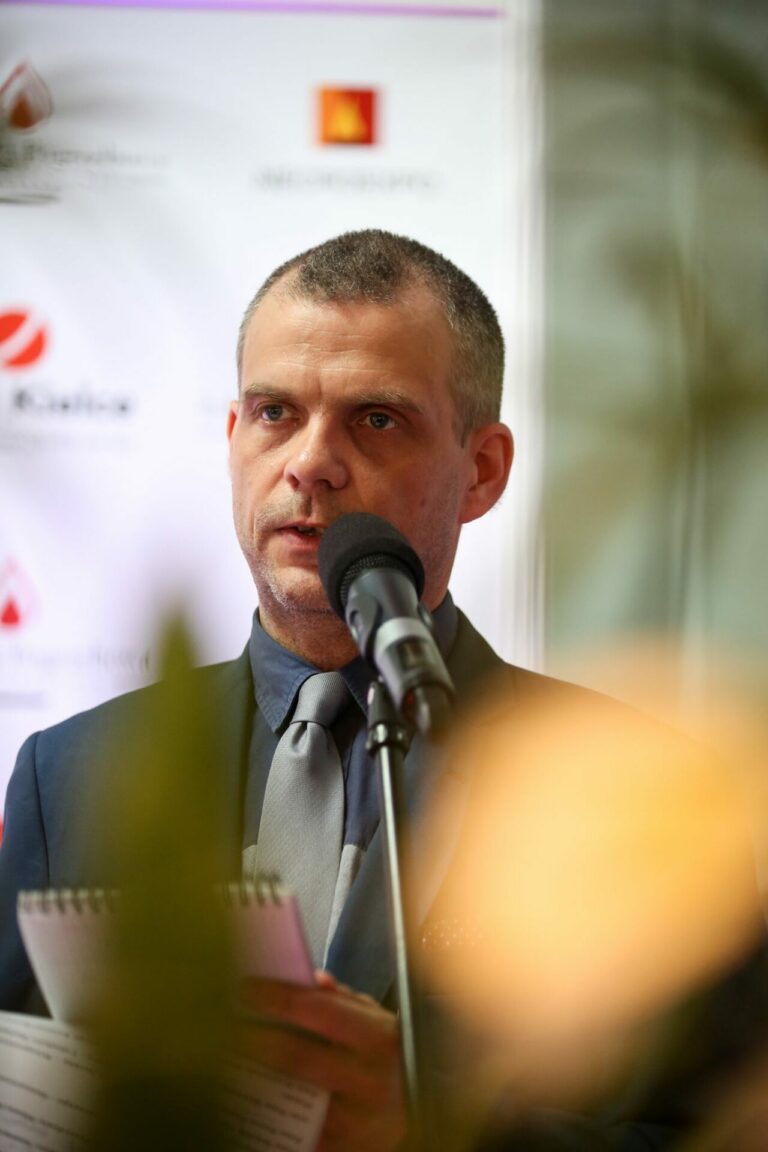So Paweł, how did you end up being an interpreter?
I was working at a Polish radio station for many years as a radio host. The work was, similar to an emcee, about creating an experience for people, how they would feel within a designated time. I was quite popular and when people know you and like you, they want to invite you to host concerts and meetings, discussion panels. In Poland, there’s often a TV personality hosting an event. So that’s how I got the opportunity to host events, which I did on the side. After some time, I quit the radio station. That was 23 years ago.
Why did you quit?
I got a new boss. The boss’ and my opinions diverged. It seemed like the right time to leave. I had already done interpretation at some events as well as on air live, by then and thought it would be a good idea to pursue it full time.

Paweł and Sonia inside an interpreters ‘ booth
Right and how long have you been working with Sonia?
Sonia and I had the same client 7 years ago. We clicked right on at the first meeting. We like each other very much and we understand each other very well with just a look. That’s invaluable especially in our profession.
It’s something I’ve asked Sonia, and I ask you as well. What would you say are the stresses of your job? Do you find it to be a difficult or demanding job?
I can’t remember where but I recently read on a list of professions that have people suffering from somatic illnesses, interpreters are 3rd in line after pilots and air-traffic controllers.
Wow! Why do you think that is?
It’s often high-stakes. Sometimes these are conferences for politicians discussing issues which have serious impact. Then of course there’s the matter of being a successful bridge between two parties who cannot speak to each other directly. It’s not light. Once I had to interpret for someone who had sold their company to a foreign investor. The investor had gone ahead and fired all the employees. The old owner wanted to speak to the new owner in an attempt to get back the former employees rehired. It was a delicate and stressful situation. There was a lot on the line.

That’s a sad and delicate situation. Would you say this was the most stressful event you had to interpret at?
No. That would be the one of the EU-level meetings and my consecutive interpretation at the ceremony. Hundreds of people there and you are standing behind the speaker– you cannot see them, their body language or face and you can barely hear them because there is a lot of noise around. You are in the crowd and there’s no designated booth.
Once there was no reception and I couldn’t hear anything for about 30 seconds, leading to a gap in interpretation. Consecutive interpretation is harder than simultaneous interpretation because the speakers are talking at a stretch and you interpret only after they have finished. And sometimes they can get into debates with each other. It’s a lot to listen to, recall and interpret.
If I asked you, is there one thing you have learnt from being in this profession– what would you say?
One thing? I’d have more than one thing to say. Normally you go to university, pick a subject and then you get to learn. But when you go to conferences, you are learning about different things regularly. Another thing it has taught me is to control my emotions.
How do you mean, control your emotions?
If you see a swan, it looks beautiful and elegant on the water. But underneath, its feet are paddling away. Interpreters must be like that. No matter what you feel, it cannot come to the surface. Your emotions cannot affect the interpretation.
Could you give an example?
I was interpreting on national TV for a Ukrainian mother who was describing what had happened to her two nights ago: she had lost her child in a bombing. Immediately my mind went to my child– I have a 10 year old– and it was not something I focused on at that moment. It wasn’t about me and my fears, but communicating her experience in the right way.
Is there anything you would like to talk about that I haven’t asked?
I would say that remember that interpreters are still humans. Sometimes you can’t see us because we are hidden from view but remember that there is a person on the other side of what you are hearing. Don’t blame the messenger.

Could you elaborate on that?
Sometimes people get angry or dissatisfied with a word we might use. You’ve to remember we are making split second decisions continuously and of course there are errors on occasion. The error isn’t of meaning but exactitude. For example there was a religious event where while interpreting the interpreter decided to go with the word “Sir” instead of “Father”– there wasn’t a direct equivalence from Polish to English– and a professor at a university wrote about it, saying that was the wrong choice of word. But as I said, these are split second decisions being made and if the message conveyed is accurate, you should leave room for human error.
[This interview was conducted and edited by Aayati Sengupta.]

